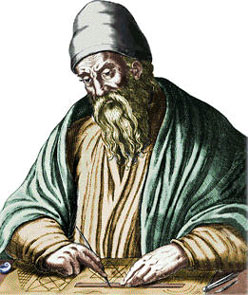More People of Greece
More Topic Categories
Euclid (~-325 - ~-265)
 Euclid was a Greek mathematician, also known as the “Father of Geometry”. His work “Elements” is one of the most important in the history of mathematics and has been used as the foundation of geometry education of the West in the past 2000 years.
Euclid was a Greek mathematician, also known as the “Father of Geometry”. His work “Elements” is one of the most important in the history of mathematics and has been used as the foundation of geometry education of the West in the past 2000 years.Not much is known about Euclid’s life. He was probably born around 325 BC and died around 265 BC. He may have studied at Plato’s Academy and was later invited by Ptolemy to teach at the University of Alexandria. That’s where Euclid stayed for the rest of his life, founding his mathematical school.
His teaching methods were inspired by Archimedes; he was fair, patient, honorable and gentle, but also sarcastic. According to a story, one of his students complained that he had nothing to gain from mathematics. So Euclid called a slave and told him to give the student one coin, so he does gain something from his studies. A different story has Ptolemy asking Euclid whether there is a simpler way to learn geometry, bypassing the theorems. Euclid answered that there is no royal way in geometry and sent the king to study.
Other works by Euclid are “Data”, “Phenomena”, and “Optics”. “Data” are closely connected to the first four books of “Elements” and contain definitions and axioms. “Phenomena” revolve around spherical shapes in an effort to explain planetary movements. “Optics” has to do with vision and connects the size of objects to distance and angle of viewing.
In the thirteen “Elements” books, Euclid introduces the basis of Greek geometrical knowledge. Other mathematicians had written similar books in earlier years, but Euclid’s work was soon recognized to be highly advanced. Each volume includes definitions, axioms, and theorems. Euclid decided to base his mathematical proofs on the most basic and self-explanatory statements, managing to conventionalize Greek mathematics. Among the subjects he covered are included the Pythagorean theorem, algebraic equations, circles, tangents, theory of analogies, perfect numbers, properties of positive integers, etc.
The “Elements” were translated in Latin and Arabian, which was crucial in the work surviving in our time; many catastrophes, including the burning of the Great Library of Alexandria, destroyed many copies. The first printed copy was published in 1482; since 1700, Euclid became increasingly popular and respected and “Elements” were considered one of the greatest mathematical works of all time. Nevertheless, the work had some shortcomings and some controversial ideas. One of the best known is the fifth axiom, known as the parallel axiom. According to this, for a straight line and a point not on the line, there is only one other line that is parallel to the first, passing through the point. As Euclid was unable to provide mathematical proof, he assumed it to be true. The mathematicians of the future could not accept that such a fundamental statement has not been proven and tried to provide proof. Nevertheless, the proof has not yet been found.
Despite the shortcomings, though, Euclid remains one of the first mathematicians who tried to conventionalize mathematics and base them on proof. His works became the foundation for the generations that followed.
See Also:
 Athens Photos
Athens Photos
 Santorini Photos
Santorini Photos
 Crete Photos
Crete Photos
 Meteora Photos
Meteora Photos
 Corfu Photos
Corfu Photos

